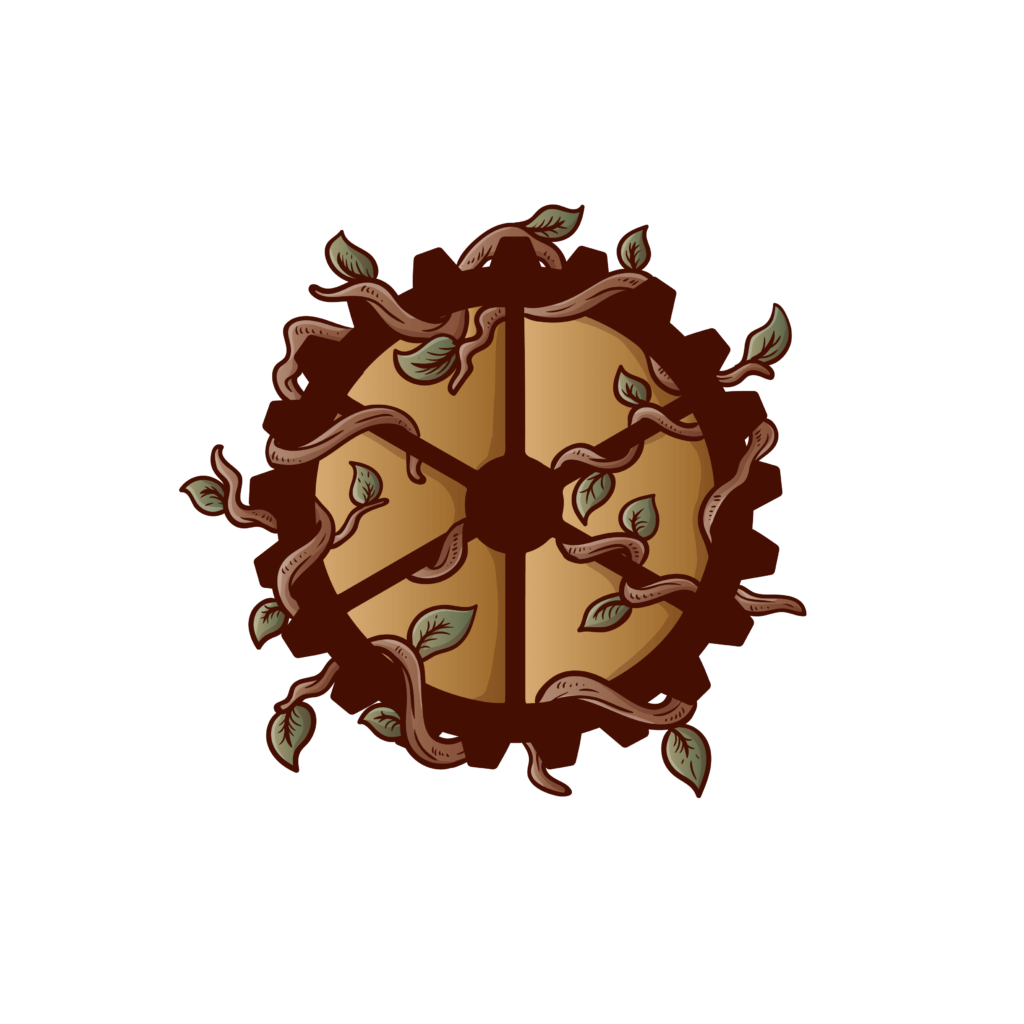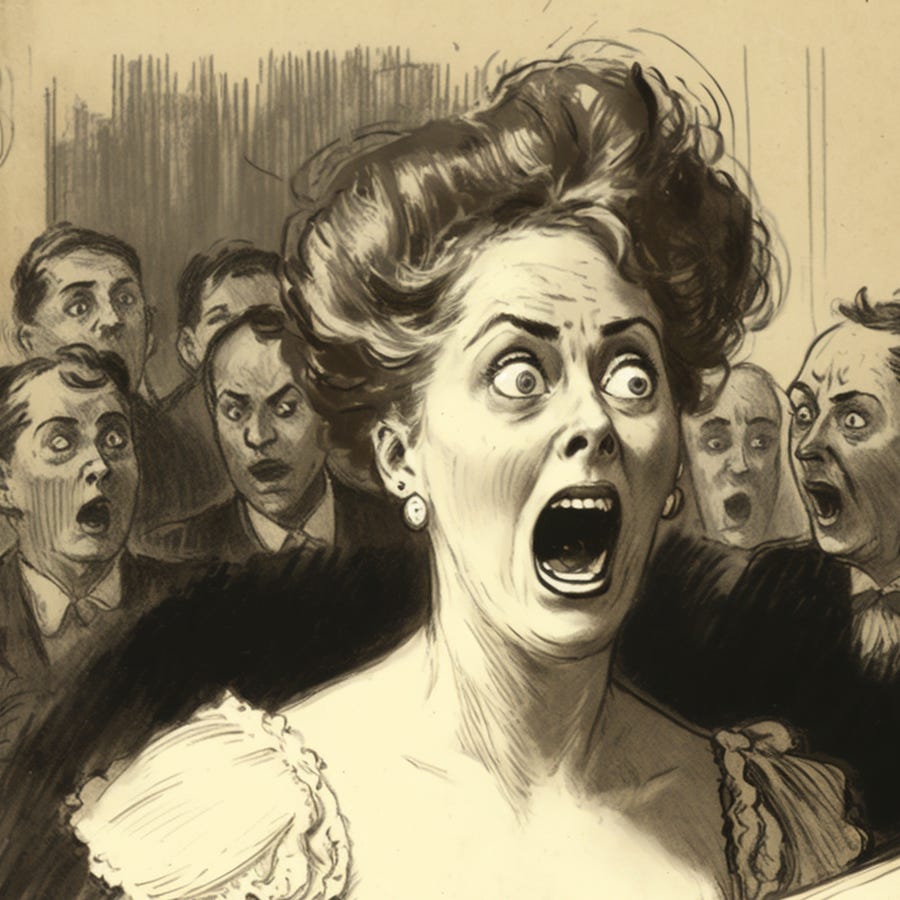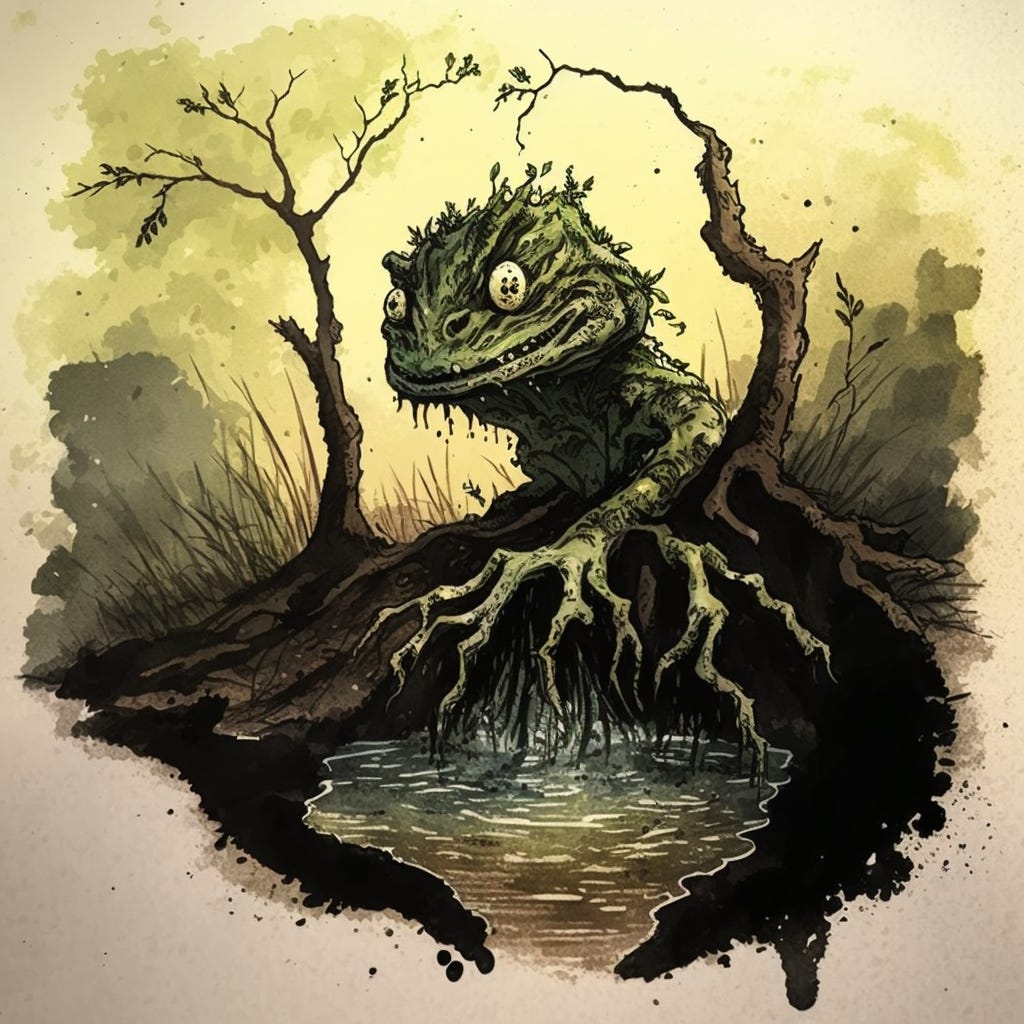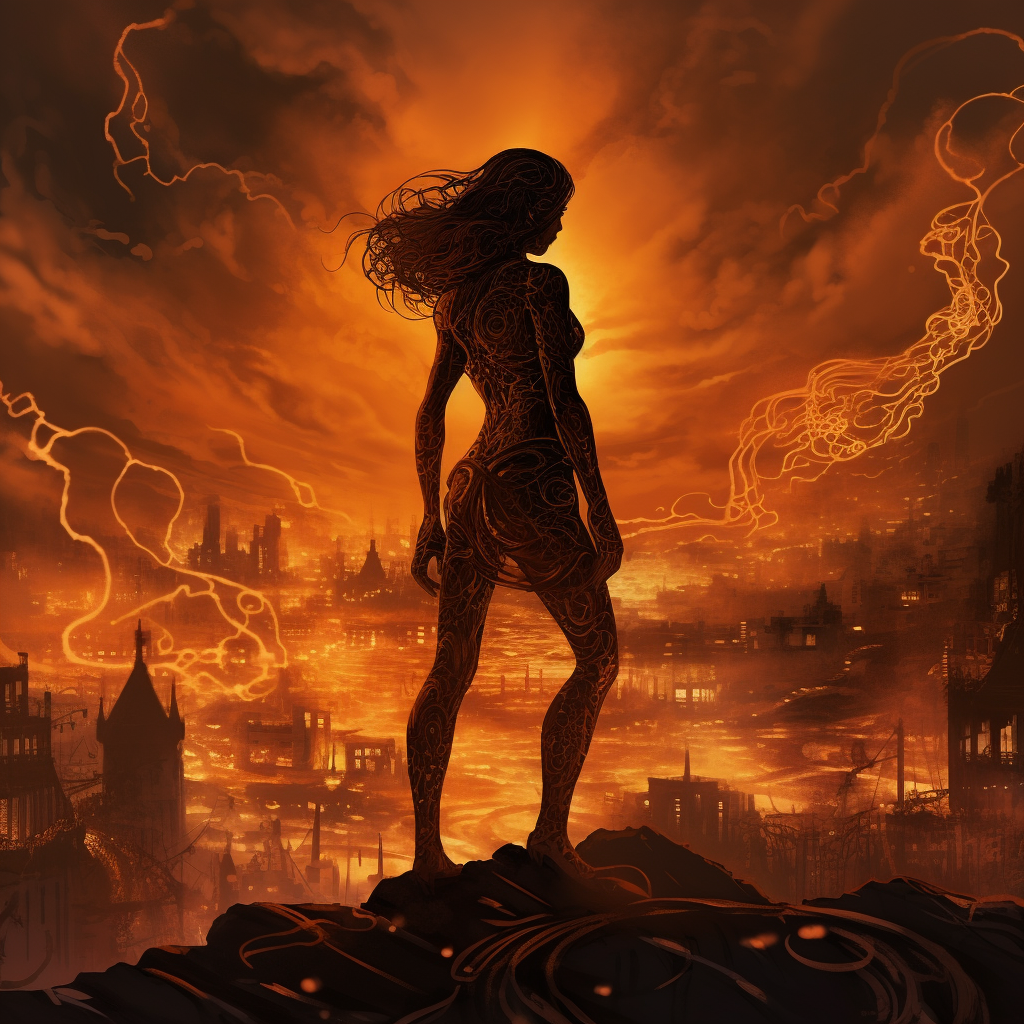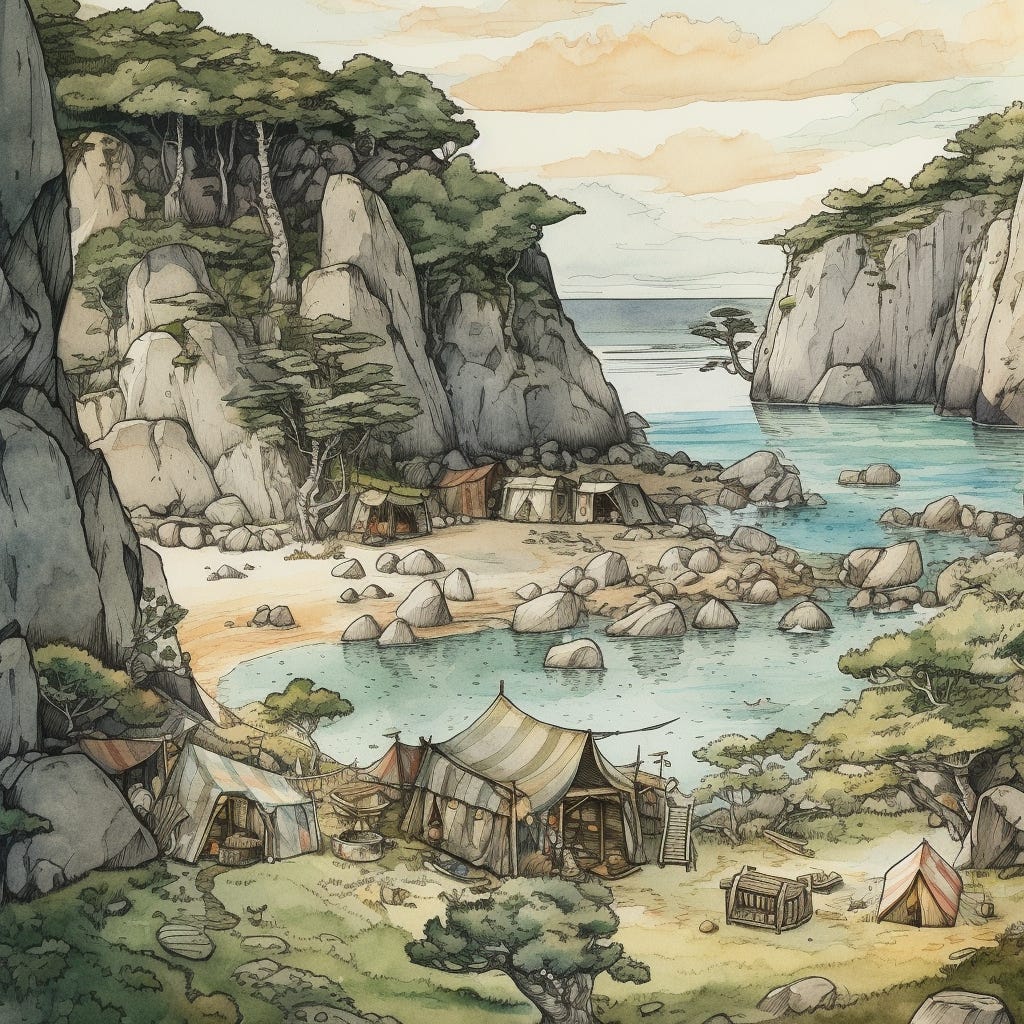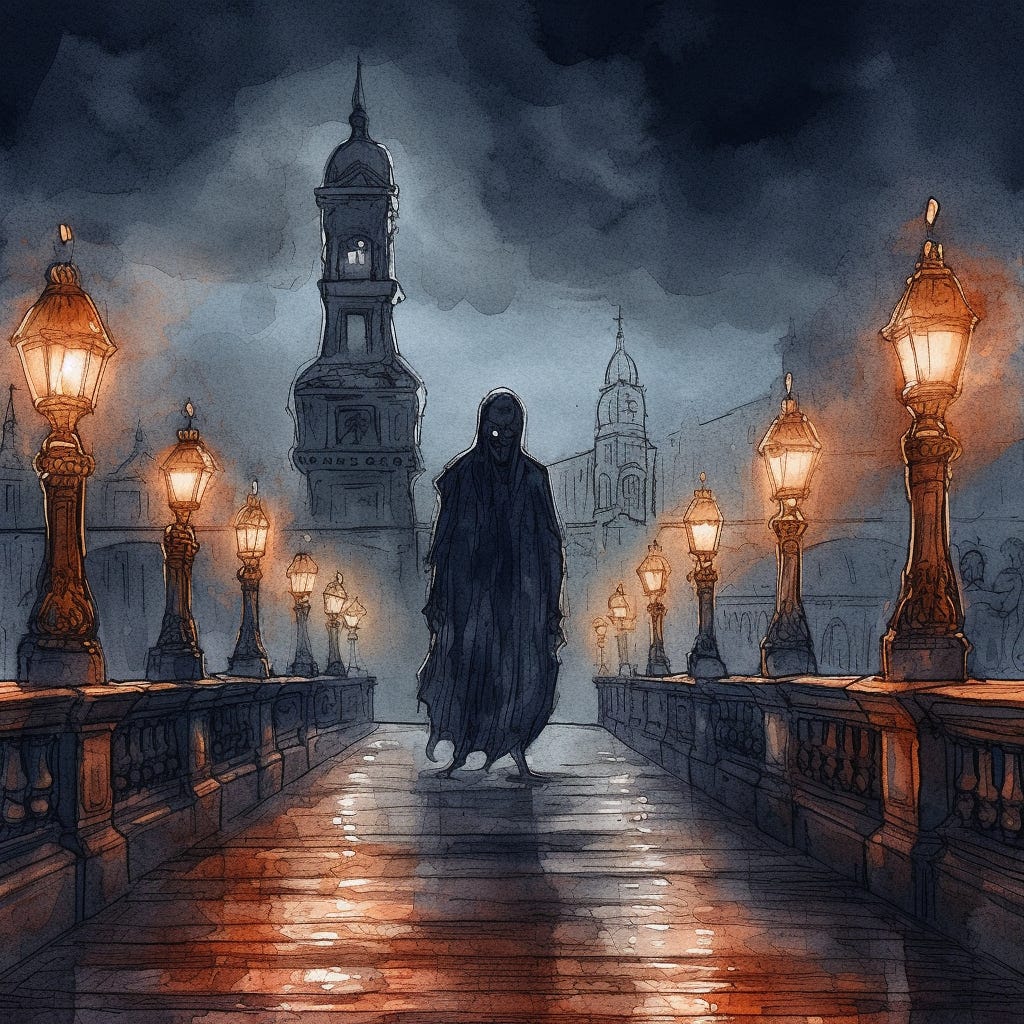Blood of a Titan, Heart of a Mountain
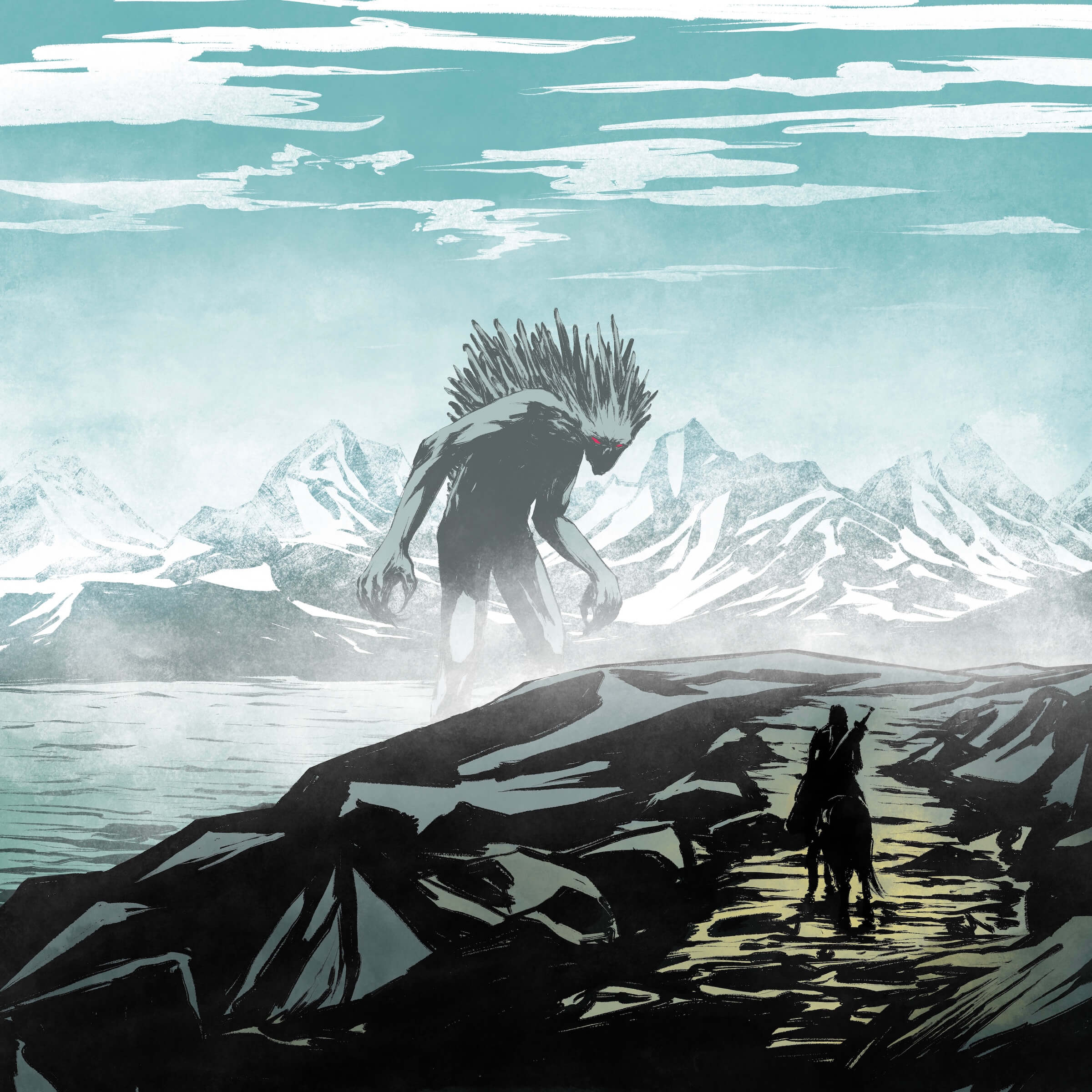
The Northern Reaches were always harsh — but they were not always frozen. Sit and listen: I will tell you how they came to be frozen and cut off as they are, full of strange beasts and mystery.
The landscape reflected the conditions back upon its settlers in the days before the ice. When the sun beat down in the summer, the ground would capture and hold its heat, quick to scald if you were not careful. In winter, the ground would freeze and crack. And throughout the year, food could only be grown where the rocks had split down to the soil. Seeds would take hold in the small fissures, catching rain in the spring and allowing for abundant growth. During the harvests, the settlements would send small caravans to the large caverns in the mountains to prepare them for winter occupation.
Centuries ago, when the north was not so shrouded in ice and mystery, Old King Ferronis led his people from their settlements across the reaches toward the Ancestors’ Caverns carved deep into the mountains as he always did at the first signs of winter, following in the wake of the harvest caravans. In great droves they traveled until they reached the safe haven built to shelter them from the storms of winter.
But when they arrived, they were met not with the warm embrace they expected — but with a monster straight from the old tales of their grandmothers.
A Titan made of ice and rock blocked the Ancestors’ Caverns, a Titan as big as the mountain it sat against. All had heard the legends of Titans: That the Titans themselves were the bringers of winter, causing earth to freeze and snow to fall simply because they roamed the lands. Just the stuff of legends — and yet, here sat one of those legends, obstructing their haven from the winter.
King Ferronis’s people were tough: They had to be to live in the harsh Northern Reaches. They stood tall with pale, almost gray-hued skin. Their lean muscle seemed sculpted out of the barren rocky terrain itself. But despite their fortitude, they knew they could not last the winter camped outside the caverns.
Though Ferronis’s people were not accustomed to fear, they knew anger. And a known enemy, friends, can be just as dangerous as those unknown. Their anger turned upon their king, filling their whispers with venom.
They loved Ferronis the King as they once adored Ferronis the great warrior, but a leader must fight battles with more than steel. His years hung about him like a cloak, his movements slower than they once were. Men and women grow old; perhaps, Ferronis’s people whispered amongst themselves, it was time to elect a new king or queen who would have fresh strength to bring them to safety. Perhaps it was time to choose someone who was not a warrior. They hadn’t known true war for some time, not since Ferronis united the clans. What good was a sword during a time of peace?
These whispers reached Ferronis’s ears. He heard their concerns and saw as they turned their hopes to the healer woman, Heshriit. Meanwhile, his trusted council bickered endlessly over the the matter of the Titan. Half advised caution, afraid to antagonize such a beast and encouraging patience, for perhaps the Titan would leave before winter fully enveloped the north. The others on his council called for action — though what action, exactly, they didn’t or wouldn’t say — and spoke to Ferronis of the people’s anger.
Ferronis refused lead his people to an inevitable death. But he knew rash action or foolish inaction would result in either. He felt divided himself, split between keeping his people safe and proving himself once again the great warrior who had won the throne in his youth.
Seven days they were stranded, and still King Ferronis’s council was divided. On the eighth day, Ferronis left the meeting tent in the encampment and walked alone to his own tent.
With his council and his own mind divided as they were, he turned, as he always did in times like this, to his partners. They knew his heart and his mind better even than himself. Such is the way of love.
Nadrath had known Ferronis since they were babes, and she had given him two children in their time together. Though she never wielded a sword, she was a warrior in her own way. He valued her compassion and patience and knew without her he would be a man weakened with pride and bloodlust. She helped him keep the best interest of his people in mind.
Brevven stoked the flames of Ferronis’s warrior’s heart. They’d met on the battlefield and had grown close first as rivals and then as allies. Brevven always made sure his king’s decisions were righteous and honorable.
Ferronis found Nadrath and Brevven in his king’s tent. As he burst through the flaps, Nadrath and Brevven watched him and said nothing. They knew about the council’s division. And, of course, they knew Ferronis’s frustration. With just one glance, they agreed to allow Ferronis his space until he was ready to speak.
“The fools can’t come to a decision!” Ferronis finally roared. “That, or they’re incapable! I’m not sure which is worse.”
Brevven and Nadrath shared another glance.
“You are the king,” Brevven said. “Advisors may bicker like children, but the command is yours. They advise and aid in your decisions.”
Ferronis spun on Brevven, a reply full of anger bubbling up. But Nadrath cut him off.
“My love,” she said, “He’s right. No king should have to face a thing from mothers’ tales, but you must choose. You lead our people, not the council.”
Ferronis fell silent again. He felt so much love and gratitude for them, even more now during this desperate time. His shoulders sagged, and he was neither Ferronis the King nor even Ferronis the Warrior. No, here, in his home with his loves, he was only Ferronis — just a man who had lived what we would consider two full lives now, for the harsh folk of the Northern Reaches lived long lives then. Some say such people were simply too stubborn to die. Now, Ferronis felt his years weigh on him like a sack of rocks.
“To fight that thing is death,” Ferronis said. He sat on the ground between Brevven and Nadreth. “To do nothing is death.”
Brevven knelt beside Ferronis and laid a hand on his shoulder.
“We cannot fight this thing,” Brevven said, “even if we had the strength we once had when we united the clans. It would be like riding our forces into the side of a mountain.”
“But there are other ways of defeating an enemy,” Nadrath said. She brought Ferronis’s head to her belly.
Brevven stood and walked to the entrance of the tent. He opened the flap and gazed at the Titan in the distance, sitting slumped against the mountain. Ferronis and Nadrath watched him.
“There was a bear,” Brevven said. “Ferronis and I injured it with an arrow, then it ran to take shelter in a cave. Remember, Ferronis? It would have killed us in such a confined space if we followed it in. But if we left it wounded, it would go feral and attack the harvesters. We lured it out with bait to finally slay it.”
“We lure the Titan away,” Ferronis said.
“But it must be kept away,” Nadrath said. “If we get inside the mountain, it could still return and entrap us.”
Ferronis nodded, lost in thought. “We would have to lead it far enough away from here so it wouldn’t want to turn back. On horseback we could outrun it. Though its strides will be long, surely it must move more slowly.”
Ferronis rose. Bolstered by his partners, the king called his council together again the very next morning.
He announced he would take a team of volunteers to draw the Titan away and gave the order to spread the call. His council questioned this, and arguments broke out yet again.
But Ferronis the Warrior King slammed his fist down, splitting the council’s table in half. It cracked like thunder, and the council fell silent. Ferronis drew himself to his full height, his furs and hides no longer hanging from him like old skin.
“This is my order,” Ferronis said. “I will take a team of volunteers and draw the Titan north.”
His voice was steady and cool as he spoke, and none spoke against their king’s order. Only one council member dared ask, “Why north, my King? Would it not be easier to lead it south, out of the north entirely?”
“Cogidubnus and his blooming city lie south,” Ferronis said. “He is an honorable man and a budding king of his own. I shall not doom him or his people with our burden.”
Ferronis returned to his tent. He stood considering his armor for a moment. Should he leave it for his children? No. How would it look if the king himself expected not to return? With this burning in his mind and the whispers of doubt from his people still echoing in his ears, Ferronis donned his armor.
Like the king himself, the armor wore years of battle on its surface but held strong. The pieces slid into place like a second skin. His sword felt heavy in his hand after years of disuse, but still familiar, like the greeting of an old friend — for a warrior always knows the feel of their own blade.
As the call for volunteers spread, the order went out for supplies. Ferronis knew he could not take much, because supplies in camp were limited and volunteers would need to move quickly. So he only took what they absolutely needed. Simple rations were gathered, things they could eat even if they were riding, and climbing gear to scale the living mountain.
The volunteers were not large in number, only thirty in total. There were those of course who agreed with the king. But many had grown bitter toward him in the long weeks they’d spent trapped in the cold, refusing to trust Ferronis’s words and actions.
The king stood before his people, adorned in his armor once more. As the wind whipped around them, raising clouds of stinging snow and dirt, he spoke.
“I will heal our people,” he bellowed with his warrior’s voice. “I will bring us to our salvation!”
His eyes found Heshriit in the crowd as his words rose above even the howls of the wind. She held his gaze with an icy glare — or was that concern on her face? Did she pity him or simply worry for the band of volunteers? He watched her gaze shift toward the volunteers, her mouth moving, as if muttering a soft prayer under her breath. Ferronis turned his horse toward the Titan and saw a woman riding near him with the same dark hair as Heshriit. A relative of some kind then? She must be praying for this woman’s safe return.
Ferronis’s mind returned to his task. He would prove himself once more, prove to his people that he deserved to be their king, prove that he was still a warrior. He would see these men and women returned to their homes as saviors. With his equipment and a small group of volunteers gathered, the king rode out.
Brevven rode amongst them. He and Ferronis had argued about him joining the band. Ferronis tried to tell him he needed to stay to ensure the encampment made it into the caverns.
“My love,” Brevven had said, “I will be put to better use in the field, aiding you and the volunteers. And why should you be the only one reliving their glory?”
You see, my friends, that is the way of love: It sometimes blinds us to reason. Ferronis knew Brevven was a great warrior and tactician who would prove invaluable, but in Ferronis’s heart he wanted Brevven to stay safe in the encampment.
In the end, Ferronis was grateful for his lover’s accompaniment, even if it filled him with the old fear of loss.
The Titan loomed over them as they approached. It was a sight, like challenging the mountainside itself, but Ferronis rode steeled in his resolve. He looked across the small band he’d mustered. They were not the best warriors, but Ferronis knew they were the bravest. Brevven rode nearest to him, and the sight of his partner bolstered him. The king let out a roar and was answered by his band as they neared the living mountain of ice and rock.
It didn’t so much as shift as they approached. The band spread out and circled the great Titan. As they rode around it, they let loose volleys of arrows, which snapped against the Titan’s flesh of frozen rock and ice. The arrows were nothing but insects to the Titan: unable to pierce its skin, not even an annoyance.
Well: If they couldn’t hurt it from here, they would have to get closer.
Ferronis gave the command. Four of the volunteers broke ranks and rode at the Titan. When they were close enough, they leapt from their horses and began scaling the thing, finding purchase with ice axes.
As the volunteers neared what seemed to be the Titan’s waistline, the beast shifted. It didn’t move quickly, but it was surprising nonetheless as it swung its arms about itself, crushing the four climbers against its body as if caught in an arcing avalanche. A sound of cascading thunder followed.
Ferronis knew being a warrior meant accepting death. All his warriors knew this just as well. But do not get it twisted — this does not mean the warriors of the north were or are heartless. Ferronis and his band mourned their fallen and remembered their names: Fris, daughter of Tordrel; Pendric, daughter of Koloi; Gadril, son of Gedris; and Hindrel, son of Gedris.
In a rush of wind and cracking earth, the Titan rose and stepped toward the party of soldiers. Though Ferronis had lost four of his band, the first part of their plan was successful: They had the Titan’s attention.
Ferronis led his party north, and the Titan lumbered after them.
They rode for days, the Titan shaking the earth with each of its footfalls as it followed them. It would swing its massive arm down at them when it could, and occasionally these blows would land, sending another of Ferronis’s volunteers flying broken to the ground. They could neither slow nor look back to see whom it had taken, but each time they felt the wind from the Titan’s swing and heard the scream. They could only keep riding, drawing the beast further and further north.
On the fifth day, however, the Titan stopped. Slowly, it turned away from its quarry. The band halted and watched, realizing the beast had lost interest in pursuit and was returning south. The encampment might have made it into the caverns by this point, but the Titan still might bring the mountain down on top of them all. Then they would be trapped in the caverns, sealed away with the memories of their ancestors.
Old King Ferronis wondered if all was lost.
Suddenly, Brevven began barking orders. Three volunteers broke away and rode straight at the behemoth, gritting their teeth and gripping their reins until their knuckles popped with the effort. Brevven rode alongside them, breaking off only after the three volunteers had leapt upon the Titan to scale it. All Ferronis and the rest could do was watch.
Again, the Titan did not respond until the three made began cresting its waistline. Right as the climbers pulled themselves to a ledge, the Titan’s rockslide fists crushed them against its body — three more souls lost to the walking mountain’s wrath: Istdro, daughter of Yindra; Thol, son of Indris; and Len, son of Guthrik.
Brevven barreled back to the rest of the group, shouting to turn and ride. The band around Ferronis took off at his words, following Brevven as he sped past. Ferronis kicked his own mount into motion.
The Titan was pursuing them once more, its pace quickening until it was faster than it had been previously. Was it angry? Could it even feel such things? Its attacks came more frequently and fiercely.
Anger bubbled within Ferronis. Brevven had taken charge when the king should have instead. How would this make him look? The volunteers would think he was an old fool who had lost his edge, like a sword hanging dull on a wall. But maybe that’s what he was, now. He noticed several of the volunteers steering closer to Brevven.
Did even these volunteers hold so much doubt in him as king? The anger churned within Ferronis, sprouting fangs as he watched Brevven ride close to him.
Anger, like love, can blind us, though in a very different way. Ferronis’s anger was blinding him from reason, consuming him now. His fear of losing his throne and being seen as an old fool only fanned the anger burning within him.
“You sacrificed those souls for nothing!” Ferronis shouted above the rushing wind. “You know better!”
Brevven stiffened in his saddle as if struck. Anger from a loved one can feel like a knife to the heart.
“Should I have done nothing like you, my King?” Brevven said.
Brevven’s words bit even sharper than the fangs of Ferronis’s own anger. Before Ferronis could reply, there was a mighty crash behind them: Two more volunteers were crushed beneath the Titan’s fist.
“Fan out!” Ferronis called. “Don’t ride in a tight group.”
He saw a momentary hesitation as some volunteers briefly looked to Brevven before fanning out. Ferronis watched Brevven ride away from him, and his anger fanning now at the same volunteers who had hesitated. The woman with dark hair — the relative of Heshriit — was among those who rode near Brevven. Did Heshriit’s entire family live to undermine him? Were they all working to steal the throne from under him?
I can tell you this: Heshritt and her kin did not aim to depose Ferronis. Heshriit was a healer and only wanted to care for her people. She was one of many who passed down the story of Ferronis and his brave band. But when anger consumes a soul, it makes enemies of everyone.
Ferronis and the band lost track of the days as they continued riding north. Each time the Titan begain losing interest, Brevven again would ride out with a pair of climbers. Each time, the climbers would be crushed against its body. But still, after every attempt, the Titan would renew its chase.
Ferronis knew the sacrifices were necessary. His anger, however, kept him from admitting this even to himself, spurred on as more and more of the riders grouped closer to Brevven instead of their rightful king. He saw their weariness and the way each death weighed on them like a lead ball. A much deeper voice, buried under his anger, couldn’t blame them for following Brevven. What had Ferronis done to earn their loyalty? Nothing. What solutions or orders had he offered to combat this beast? None. That doubt sat nestled heavy as iron within his heart.
On the eighth day, Ferronis saw Brevven approach, shouting something. What could he want in this moment? The band seemed to wholly follow his commands, now, not Ferronis’s. The anger at this ultimate loss of authority bit into Ferronis like a viper. And thus, Ferronis drew his eyes away from Brevven as if to avoid the viper’s strike, instead focusing elsewhere and prentending not hear to hear his lover’s shouts.
Brevven slowed his mount to claim Ferronis’s attention. He pointed at the Titan.
But in that instant, the beast took him.
With a crash like a frozen wave, Brevven and his mount were just gone, nothing but a crater left where they had been moments before. A wave of snow and chunks of earth erupted outward from the place Brevven had disappeared. The sound was of a mountain falling to the earth unhindered.
Ferronis gazed at the spot Brevven had perished. A knot of guilt coiled around his innards. He knew then that Brevven’s death was his fault. It was his anger, his hubris, his failure that killed Brevven, son of Bowwen, and beloved partner to King Ferronis of the Northern Reaches.
It was only then — his anger snuffed like flames beneath cold water — that Ferronis finally saw he was the only one left of his band. He pulled to a stop in disbelief. Had he been so proud he had ignored his entire band out of petty anger? Bodies lay broken and scattered around him.
The weight of this crashed over him like one of the Titan’s own blows. With their forms mangled and partially buried in snow, he could not even tell who was whom.
The Titan lumbered to a halt over the lonesome king and pulled one of its massive arms back. Air rushed around it in cold waves from such a simple motion.
So this was it. This was how Old Ferronis would die, as broken and forgotten as his sword in the north. He wondered what Brevven was trying to tell him at such great risk. His eyes found the spot where Brevven had died.
What had Brevven been trying to say? He had been pointing at the Titan and shouting something. That was when it attacked him, but it hadn’t just swung an arm and leisurely knocked him aside. No, it had targeted him, one straight swing straight down at Brevven.
But why?
The air rushed around Ferronis with the Titan’s swinging arm, pulling at his furs. A moment before, he had been resolved to die, but something in him sparked and kicked his horse into movement. He darted toward the spot where Brevven lay dead and broken, but the wind from the Titan’s approaching swing was enough to lift him and his mount off the ground.
With a crash so loud his ears bled, the Titan’s fist landed, launching Ferronis into the air with such velocity his eyes and skin stung. He hit the ground; his body twisted across jagged rocks.
He saw the world at spinning angles — but he also saw an opening near the great walking mountain’s chest. It looked craggy and rough-edged, like the mouth of a cave made entirely of icy rock and stone. Is that what Brevven had been pointing at as he shouted? Was that why he had continued to send so many of their band to climb the beast?
The Titan had only begun truly chasing them after climbers had attempted to scale its body. For some reason it must be protecting that opening. Brevven had figured this out and knew the only way the Titan would continue pursuing them is if it thought they were a threat to that cavity in its chest. That’s why he continued sending climbers after the Titan.
Ferronis stood. He knew something in his body was broken — maybe his ribs — but he was alive.
The Titan was already lumbering away. Ferronis could not let it go. He had to find a way to end this — and to do that, he would have to scale the Titan and enter that opening.
He had landed some two hundred feet from where he’d been riding, and his horse was nowhere to be found. But he could see the broken body of Brevven in a small crater nearby.
Ferronis approached the body of his partner and pulled the climbing gear from his tangled form. Then the king knelt next to his fallen lover and placed a soft kiss on Brevven’s forehead.
“Thank you,” Ferronis said. “May the Ancestors welcome you as their own.”
He could feel the grief welling in his chest, but a warrior knows how to lock those feelings away until the battle is finished.
And King Ferronis was a warrior.
Thankfully, luckily, he had managed to hold on to his sword despite the Titan’s blow. Pain shot through his chest as he ran across the land toward the Titan. It moved slowly, but its strides were worth ten of his at least. Ferronis fought through the stabs of pain and ran as he never had before, not even in his youth.
It was not enough.
He could feel his age mixing with the pain of his broken ribs. His gait slowed, the burst of rage and energy suddenly gone.
Then he heard the hooves thundering behind him.
One final volunteer rode toward him like a demon, covered in snow and blood. One of her arms stuck out at an odd angle. She rode straight at him, slowing only enough for him to catch the mount behind her. They exchanged not a word as they darted toward the Titan, but an understanding was there. As they rode alongside the Titan, they both knew what to do.
They both leapt from the horse.
With a mighty roar, Ferronis slammed the ice axes into the Titan’s leg and began to climb. It was like climbing a sheer wall of ice. He could see cracks in the surface where others had climbed before him. Wind, snow, and rocks crashed around him from the Titan’s strides, the sheer cold of it searing his skin. It was harder to breathe this close to the Titan, as if its very presence froze the air as well. His armor grew heavy, and Ferronis was forced to shed it as he climbed further. The woman climbed below him, finding her way through a combination of her lone good arm and climbing boots.
By the time they reached the beast’s waist, Ferronis’s arms seized with exhaustion, the pain in his ribs cleaving clear through his chest. He gasped for breath, but pulled himself onto the small lip and then helped the woman up. The Titan must have thought the entire band was dead: That’s the only reason he could think why they weren’t already crushed like the climbers before.
Ferronis tucked one of the ice axes into his belt and hefted his sword. Using the other axe to brace himself on the Titan’s body as it walked, he made his slow and careful way around the mountain’s waist until he saw the opening.
The pair stepped in and found it wound yet deeper into the Titan’s body. The rumbling of the Titan’s steps fell away, the tunnels of this strange bodily cavern muffling and muting the sounds. This was the way forward, the only way he could see to save his people.
Steeling himself, he looked to the woman as they began their trek into the bowels of the Titan.
They soon found they were not alone. White bat-like beasts, each the size of a man, swooped down upon them, their screeches like the sound of shattering glass. Their claws and fangs tore into them as they swung their swords through the swarm. Ferronis felt his blade bite through their flesh, spraying him in thick blue ichor that froze on his skin in patches.
It felt like he fought his way through swarms of the creatures for a century, the sole surviving volunteer by his side the whole way. He gripped his sword with both hands, lest it slip from the blood running down its blade to its hilt. Each swing found its mark in the strange white hides of the bat creatures, spurting more and more of their blue ichor across him and the ground. It congealed and froze wherever it struck.
His skin went numb, a blessing and curse. He could no longer feel the burning of the frigid interior of the Titan, nor the bats’ blood on his skin — but his arms grew heavy with the loss of feeling. The woman next to him swung with all the might her lone good arm could muster, stabbing and slashing the creatures swarming upon them with every step.
His sword grew dull, so he swung harder and broke the creatures’ bones, instead. There was the sound of a falling tree as the last of the creatures finally died with its neck snapped in two. Ferronis’s sword split and shattered. He slumped to the ground, streams of blood flowing from his wounds, mixing with the blue ichor matting his furs and freezing upon his skin. The bats had clawed and bit at him the whole way, slicing his flesh and tearing chunks from him.
He felt so sleepy, sitting with his broken sword in his hand. Maybe he was a fool after all, thinking he would survive.
The woman knelt beside him, blood frozen and matted along her body as well. If he looked anywhere as bad as her, he surely was not long for this world.
“My King,” she said, “we must keep moving. There are still more coming.”
Ferronis knew not to make the mistake he’d made with Brevven’s, for her words rang true: He could hear the scrape of more creatures’ talons echoing through the icy walls around them. Ferronis was old, but he was also stubborn. He would be damned if he let himself die now without at least slaying the Titan.
One last time, Ferronis pushed himself to his feet and leaned against the icy wall of the cave. Did these tunnels lead throughout the Titan’s entire body? Were they in its veins, and these creatures some sort of protectors?
Ferronis faced the woman standing before him.
“What’s your name?” he asked.
“My name?” she said. “My King, that hardly matters.”
“You look so familiar, and I’m sorry that I cannot recall your name,” Ferronis said. “But I must know it so I may tell the Ancestors who was the great warrior standing beside me in my last and finest battle.”
She nodded once.
“I am Liwana,” she said, “daughter of Heshriit.”
The ground beneath him shook as the Titan took another step, and Ferronis laughed — a deep, hearty laugh that shook him more greatly than any blow from the Titan. That the daughter of the rival to his throne stood with him in death when so many others had already fallen was a trick worthy of the canniest of gods.
“It is my honor to know you,” Ferronis said.
The bats swarmed from the tunnel behind them and angled toward the pair. Liwana gritted her teeth and hefted her cracked sword.
“Go!” she said.
And with a growl, she lunged into the swarm.
Ferronis rushed deeper into the tunnels. With each limp, he left a line of blood along the wall in his wake.
The path ended in a massive antechamber. At its center, a blue and white lump of muscle stood coated in a layer of ice. It beat slowly, almost imperceptibly.
This was the Titan’s heart.
With a roar that rended his chest, Ferronis leapt and stabbed at it. His broken sword scraped against the layers of ice, cracks branching from each strike.
Over and over and over and over, he stabbed his broken blade down. Chunks of steel and ice frayed with each strike.
Until finally, his blade sank into something soft.
The heart twitched once — and then gouts of blue blood crashed over Ferronis. Whatever the Titan’s blood touched froze solid.
It is said Liwana, daughter of Heshriit, stands locked in a frozen battle with a horde of demons. And it is said King Ferronis still stands, frozen, with his broken blade plunged into the heart of a mountain.
And as the Titan fell, its blood flowed from it like a river — freezing the Northern Reaches for all the rest of time.
